In an era where technological advancements dominate our daily lives, smartphones have become an essential tool for communication, entertainment, and productivity. However, with great innovations comes the risk of counterfeit products flooding the market, including charger cables. Unbeknownst to many, using a fake or substandard power cord can not only lead to inconveniences but also pose potential hazards.
The key to preserving the lifespan of your beloved smartphone and ensuring your safety lies in acquiring a genuine charger cable. But how can one distinguish an authentic power cord from a counterfeit one? This article endeavors to shed light on the various methods and tips that will empower you to discern the legitimacy of an iPhone charger cable without relying solely on brand logos or imprinted trademarks.
One of the simplest yet most reliable methods to authenticate an iPhone charger cable is by taking a closer look at its physical attributes. Genuine cables are thoughtfully crafted with premium materials that not only enhance its aesthetics but also guarantee durability. The texture of the cable should be smooth, with robust insulation and fine finishing. Additionally, authentic cords often possess a distinguishable weight that reflects the quality of their construction.
Signs of a Genuine iPhone Charger Cable
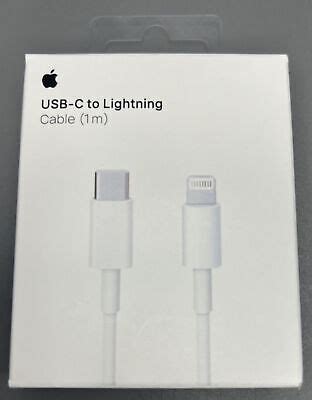
When purchasing an accessory for your Apple device, it is essential to ensure its authenticity. Recognizing the signs of a genuine iPhone charger cable can help you avoid inferior or counterfeit products that may damage your device or compromise your safety.
1. Brand Packaging: Genuine iPhone charger cables are usually packaged in high-quality, professionally designed boxes that feature the Apple logo and product details. Look for the official branding elements and ensure the packaging is intact.
2. Connector Quality: Examine the connector that plugs into your iPhone or other Apple devices. Genuine cables have a solid build and a seamless connection to both the charger and the device. They also fit snugly without any wobbling or loose connections.
3. Lightning Logo: Authentic iPhone charger cables often have a small lightning logo etched onto the USB connector. This logo signifies that the cable has been certified and meets Apple's quality standards.
4. Cable Length and Thickness: Pay attention to the cable's length and thickness. Genuine iPhone charger cables typically have a standard length (approximately 3 feet) and feature a distinct thickness that feels robust and durable.
5. Text on Cable: Look for clear and precise text markings on the cable itself. Genuine cables usually have clear printing with accurate spelling and font, including information such as the Apple logo, product name, and cable specifications.
6. Authorized Retailers: Purchase your iPhone charger cable only from authorized retailers, either online or at physical stores. Avoid buying from unofficial or unknown sources, as they are more likely to sell counterfeit or low-quality products.
7. Price: While the price alone cannot determine the authenticity of a charger cable, it can serve as a clue. Genuine Apple accessories are generally sold at a higher price range compared to counterfeit or substandard alternatives.
Remember, it is crucial to be cautious and meticulous when inspecting the authenticity of an iPhone charger cable. By familiarizing yourself with these signs, you can ensure the safety and functionality of your device while also protecting yourself from potential scams.
Understanding the Significance of Genuine iPhone Charger Cables
In the realm of smartphone accessories, it is crucial to recognize the importance of using an original and legitimate iPhone charger cable. These cables serve as the lifeline between your device and its power source, enabling effective charging and data synchronization. Ensuring the authenticity of your iPhone charger cable guarantees optimal performance, safety, and compatibility with various Apple devices.
Authentic iPhone charger cables are specifically designed and certified by Apple to meet stringent quality and safety standards. They undergo rigorous testing processes to provide reliable power delivery, reducing the risk of damage to your device and protecting you from potential hazards such as short circuits, overheating, or overcharging. Genuine cables also prevent compatibility issues and maintain the stability of your device's battery health, preserving its overall lifespan.
Counterfeit or inferior charger cables may differ in appearance from genuine ones, compromising their functionality and potentially causing harm to your device. These unauthorized cables often lack the necessary internal components, including safety features, resulting in erratic charging speeds, intermittent data connections, or even complete failure. Moreover, non-genuine cables may not comply with Apple's standards, thereby voiding any warranty claims and exposing your device to potential risks or vulnerabilities.
By understanding the significance of authentic iPhone charger cables, you can make informed decisions when purchasing or examining a cable's legitimacy. Prioritizing genuine products ensures a more secure and reliable charging experience, enhancing the overall lifespan and performance of your valuable Apple devices.
Identifying Fake iPhone Charger Cables
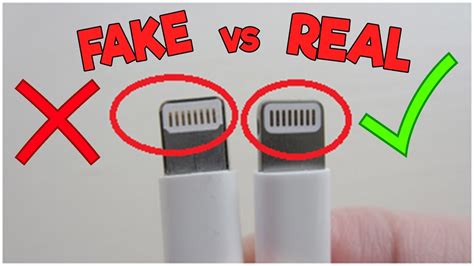
When it comes to ensuring the authenticity of an iPhone charger cable, it is crucial to be able to distinguish between genuine and counterfeit products. By understanding the key indicators and characteristics of fake cables, users can protect themselves from potential safety hazards and ensure optimal performance for their Apple devices.
| Indicator | Description |
| 1. Branding | Authentic iPhone charger cables typically feature specific branding elements, such as the Apple logo and the "Designed by Apple in California" text, which may be absent or poorly replicated on fake cables. |
| 2. Packaging | Genuine cables come in high-quality packaging with accurate product information, while counterfeit cables may have inconsistencies, including spelling errors, poor graphics, or lack of product details. |
| 3. Build Quality | Authentic cables have a solid and well-built construction, with smooth and durable materials. Fake cables, on the other hand, may have flaws like rough edges, loose connectors, or flimsy wires. |
| 4. Length | Apple-certified charger cables come in standard lengths, such as 1 meter (3.3 feet) or 2 meters (6.6 feet). Be cautious of cables that deviate significantly from these lengths, as they may indicate counterfeit products. |
| 5. Connectors | The connectors on genuine iPhone charger cables are precision-molded and feature a uniform and clean appearance. Fake cables often have poorly-made connectors, with visible imperfections or loose fittings. |
| 6. Price | If a deal seems too good to be true, it probably is. Genuine Apple charger cables have a certain price range dictated by the company, so excessively cheap cables are likely to be counterfeits. |
By being vigilant and paying attention to these indicators, users can increase their chances of identifying and avoiding fake iPhone charger cables. Remember, using counterfeit cables not only risks damaging your device but also poses potential safety hazards such as electric shocks or overheating. It is always recommended to purchase cables from authorized Apple retailers or reliable sellers to ensure the quality and authenticity of your charger cables.
Key Differences Between Genuine and Counterfeit iPhone Charger Cables
When it comes to purchasing a charger cable for your iPhone, it is crucial to be aware of the key differences that exist between genuine and counterfeit options. These discrepancies can greatly impact the safety, durability, and performance of the cable, ultimately affecting your overall user experience. By understanding the distinctive features that separate authentic iPhone charger cables from their fraudulent counterparts, you can make an informed decision and ensure a reliable charging experience.
One of the primary differences between genuine and counterfeit iPhone charger cables lies in their build quality. Authentic cables are carefully constructed with high-quality materials, ensuring durability and longevity. Counterfeit cables, on the other hand, are often made with substandard components that compromise their reliability and overall performance.
Another noteworthy disparity is the level of safety provided by genuine and counterfeit cables. Authentic iPhone charger cables undergo rigorous testing and meet various international safety standards, ensuring protection against potential electrical hazards. In contrast, counterfeit cables may lack the necessary safety certifications and pose a higher risk of electrical accidents such as short circuits or overheating.
The appearance of the cable can also provide a clue to its authenticity. Genuine iPhone charger cables showcase precise and intricate craftsmanship, with clean and seamless connections between the cable and connectors. Counterfeit cables, however, may exhibit visible imperfections such as rough edges, uneven surfaces, or poorly fitting connectors.
Furthermore, genuine iPhone charger cables often come with unique identification markings and serial numbers. These markings serve as a verification of their authenticity and can be cross-referenced with Apple's official records. Counterfeit cables, in contrast, are typically devoid of such identifying features or may contain poorly replicated markings.
Lastly, price can be an indicator of authenticity. Genuine iPhone charger cables are priced to reflect their quality and reliability. If a cable's price seems significantly lower than the average market value, it is likely a counterfeit product. Remember, the adage "you get what you pay for" applies to charger cables as well.
In conclusion, it is crucial to be vigilant when selecting an iPhone charger cable to ensure you are purchasing a genuine product. By being aware of the key differences outlined above, you can confidently make an informed choice and avoid the potential risks associated with counterfeit cables.
Testing the Credibility of an iPhone Charging Cord
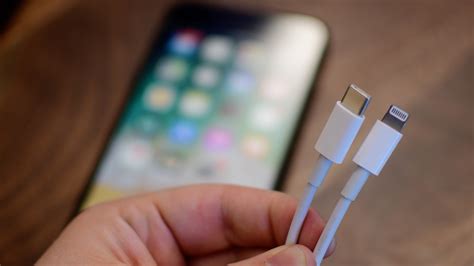
Ensuring the reliability and legitimacy of an iPhone charging cable is essential in order to avoid potential risks and ensure efficient device performance. This section will outline various methods to evaluate the authenticity of an iPhone charger cable.
1. Packaging Examination: Carefully inspect the packaging of the charger cable for any indications of poor quality or irregularities. Genuine Apple products often display professional and consistent packaging designs, including product information and relevant logos.
2. Cable Length: Compare the length of the suspected charger cable with the official specifications provided by Apple. Inauthentic cables may differ significantly in length, potentially affecting their functionality and durability.
3. Connector Quality: Pay attention to the connectors at both ends of the cable. Genuine iPhone charger cables have well-constructed connectors with precise fittings and smooth finishes. Any signs of rough edges or loose connections may suggest a counterfeit cable.
4. Cable Flexibility: Authentic cables are designed with a certain degree of flexibility to ensure comfort during usage and durability over time. Check whether the cable bends easily without any signs of stiffness or resistance.
5. Weight: Genuine iPhone charger cables are designed to be lightweight and easy to carry. If the cable feels significantly heavier than expected, there is a possibility that it is not genuine.
6. Apple's MFi Certification: Look for the "Made for iPhone" (MFi) logo on the packaging or cable itself. This certification indicates that the charger cable has undergone thorough testing by Apple and complies with their quality standards.
7. Functional Testing: Finally, connect the charger cable to an iPhone and observe its performance. Genuine cables should charge the device effectively without any interruptions or compatibility issues.
By following these guidelines, users can verify the authenticity of an iPhone charger cable and make informed decisions regarding its usage, ensuring a safe and reliable charging experience for their devices.
Tips for Verifying the Legitimacy of an Apple Smartphone Charger Wire
In the digital age, ensuring the credibility of your electronic devices and gadgets is of utmost importance. This applies to all components, including charger cables for your valuable iPhone. To guarantee the authenticity of your iPhone charger cable, there are several tips to keep in mind when examining its legitimacy.
- Inspect the Packaging:
- Check the Connectors:
- Examine the Cable Quality:
- Inspect the Lightning Connector:
- Verify the Serial Number:
Analyze the packaging of the charger cable for any signs of tampering, excessive wear and tear, or poor quality materials. Legitimate Apple charger cables are typically presented in meticulously designed, high-quality packaging.
Pay close attention to the connectors on both ends of the charger cable. Genuine Apple charger cables have well-finished, precise connectors with a smooth surface and a solid build. Ensure that the connectors fit snugly, without any loose or wobbly connections.
Assess the quality of the cable itself by checking its thickness, flexibility, and durability. Authentic Apple charger cables are known for having a sturdy, robust build, while counterfeit cables often feel flimsy or cheaply made.
A critical aspect of an iPhone charger cable is the Lightning connector. Confirm that the Lightning connector has the iconic Apple logo embossed on it and that it appears well-crafted. Counterfeit cables may have poorly made or even misspelled logos, providing clear indicators of their inauthenticity.
Ensure that the charger cable comes with a unique serial number that can be found on the cable itself or on the packaging. Use Apple's official website or a reliable verification tool to cross-check the serial number to confirm its authenticity.
By following these valuable tips, you can effectively identify whether your iPhone charger cable is genuine or counterfeit. Remember, investing in a legitimate charger cable will not only ensure the safety and longevity of your device but also prevent potential damage that counterfeit cables may cause.
Where to Purchase Genuine Apple Charging Cords
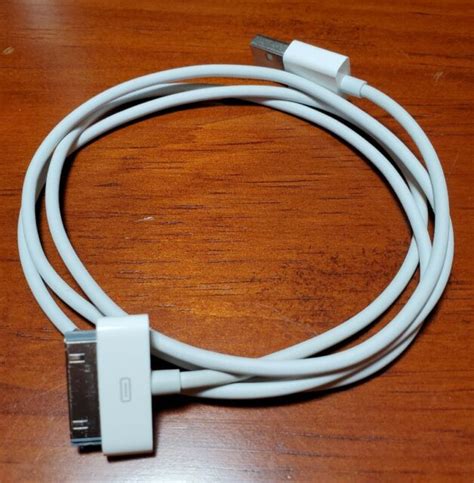
In the quest for authentic Apple charger cables, it is essential to know reliable sources where you can purchase them. This section provides valuable information on trusted places to buy genuine charging cords for iPhone devices. Ensuring you have a legitimate charger cable is crucial for the overall performance, safety, and longevity of your device.
Apple Stores: The most obvious and secure option is to purchase an authentic iPhone charger cable directly from an Apple Store. These retail outlets are authorized sellers of genuine Apple products, ensuring that you receive an original charging cord that is specifically designed for your iPhone model. Apple Stores offer excellent customer service and provide warranties for their products, giving you peace of mind. |
Apple Online Store: Another reliable source is the official Apple Online Store. This platform allows you to browse a wide selection of genuine iPhone charger cables and have them conveniently delivered to your doorstep. By purchasing from the official Apple Online Store, you can be confident that you are receiving an authentic product backed by Apple's quality standards. |
Authorized Resellers: Apple has authorized certain resellers to sell their products, including charger cables. These authorized resellers have met Apple's strict requirements and are known for selling genuine Apple accessories. It is advisable to visit trusted resellers, such as well-known electronics retailers or certified online sellers, to ensure that you are purchasing authentic charger cables for your iPhone. |
Third-Party Sellers: While it is generally recommended to purchase charger cables directly from Apple or its authorized resellers, there are some reputable third-party sellers that offer genuine products. However, it is crucial to thoroughly research and read customer reviews before making a purchase from a third-party seller. Look for sellers with a track record of providing authentic Apple accessories. |
By purchasing your iPhone charger cable from these reliable sources, you can ensure authenticity and avoid the risk of using counterfeit or low-quality cables that may harm your device or compromise its performance. Remember, it is worth investing in a genuine charger cable to safeguard your iPhone and enjoy optimal charging capabilities.
Avoiding Potential Risks of Using Counterfeit iPhone Charger Cables
Ensuring the safety and reliability of iPhone charger cables is crucial in order to protect your device and personal well-being. This article aims to highlight the importance of avoiding counterfeit charger cables and the potential risks they pose.
Dangers of Counterfeit Charger Cables
Using counterfeit iPhone charger cables can expose you to various risks, including electrical malfunctions, fire hazards, and damage to your device. These counterfeit cables are often made of inferior quality materials and lack the necessary safety certifications, making them prone to overheating, short circuits, and other electrical issues.
Impact on Device Performance
Counterfeit charger cables tend to provide inadequate power supply to your iPhone, leading to slower charging times and reduced battery performance. These cables may not be designed to meet Apple's specifications, resulting in potential damage to the charging port and shorter overall lifespan of your device.
Compromised Data Security
Using counterfeit charger cables also puts your data security at risk. These cables can be easily modified by hackers to include additional components that allow unauthorized access or data theft from your device. Protecting your personal and sensitive information should be a top priority, and using genuine charger cables is a step towards ensuring the safety of your data.
Purchasing Authentic Charger Cables
To avoid the potential risks of counterfeit iPhone charger cables, it is essential to purchase your cables from authorized retailers or directly from Apple. Look for genuine certification logos, such as the "Made for iPhone" logo, and check the packaging for any signs of tampering or poor quality. Investing in authentic charger cables may be more expensive, but it guarantees the safety and longevity of your device.
Conclusion
When it comes to iPhone charger cables, prioritizing authenticity is essential for the overall safety, performance, and data security of your device. By being aware of the potential risks associated with counterfeit cables and making informed purchasing decisions, you can protect yourself and your iPhone from unnecessary dangers.
Ensuring Safe and Reliable Charging for Your iPhone
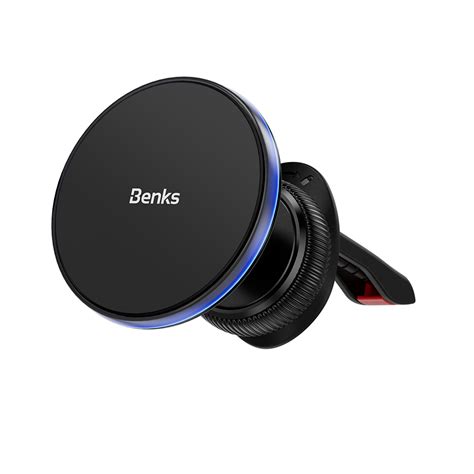
When it comes to keeping your iPhone charged and ready for use, it's crucial to prioritize safety and reliability. With the wide availability of charger cables on the market, it can be challenging to determine which ones are authentic and offer the highest level of quality. This section will provide you with essential information to help you ensure safe and reliable charging for your iPhone, without compromising on performance or potentially damaging your device.
Understanding the importance of using genuine and reliable charger cables is paramount to maintaining the longevity of your iPhone's battery life and overall performance. Counterfeit or low-quality cables may pose various risks, including short-circuits, overheating, slower charging speeds, and even potential damage to your iPhone's internal components. Therefore, it is crucial to take the necessary precautions when selecting a charger cable to ensure optimal charging efficiency and device safety.
One effective way to ensure the safety and reliability of your charger cable is to purchase it directly from authorized Apple retailers or their official website. By doing so, you can be confident in the authenticity and quality of the product. Additionally, always look for specific markings and logos, such as the "Made for iPhone" certification, to validate the cable's compatibility with your device and its adherence to Apple's stringent safety standards.
Another essential factor to consider is the durability and build quality of the charger cable. Authentic cables often feature high-quality materials, reinforced connectors, and additional insulation to prevent fraying and breakage. Avoid cables that appear flimsy, have loose connections, or lack proper insulation, as these may pose potential safety hazards and may not provide optimal charging performance.
Regularly inspecting your charger cable for signs of wear and tear is also crucial in ensuring safe and reliable charging for your iPhone. Check for any visible damages, such as exposed wiring, bent or damaged connectors, or frayed insulation. If you notice any of these issues, it is recommended to replace your cable immediately to avoid any potential risks.
In conclusion, prioritizing the authenticity, quality, and safety of your iPhone's charger cable is vital for establishing reliable and efficient charging. By following the tips provided in this section, you can make informed decisions when selecting a charger cable and reduce the likelihood of encountering issues related to counterfeit or low-quality products. Ultimately, investing in a genuine and reliable charger cable will contribute to extending your iPhone's battery life and ensuring a seamless charging experience.
[MOVIES] [/MOVIES] [/MOVIES_ENABLED]FAQ
How can I determine if the iPhone charger cable that I have is authentic?
To check the authenticity of an iPhone charger cable, you can start by checking the packaging. Look for any signs of poor quality or inconsistencies in the branding or design. Authentic Apple chargers usually have clear and precise packaging with accurate logos and text. Additionally, you can inspect the cable itself. Genuine cables will have a smooth texture, solid construction, and flush USB and Lightning connectors. Counterfeit cables may feel cheap, have rough edges, and have poorly-fitted connectors. Finally, you can also check the serial number on the cable or the QR code on the packaging by using Apple's official verification tools.
Are there any specific signs that indicate a charger cable is fake?
Yes, there are several signs that can suggest a charger cable is fake. One common indication is the price. If a cable is significantly cheaper than the original Apple charger, it is likely a counterfeit product. Another sign is poor overall quality. Counterfeit cables often have rough textures, flimsy connectors, or loose fittings. In some cases, fake cables may also have misspelled words or incorrect logos on the packaging. It's always important to carefully inspect the cable and packaging for any inconsistencies or signs of low-quality materials.
What are the risks of using a counterfeit iPhone charger cable?
Using a counterfeit iPhone charger cable can pose various risks. Firstly, counterfeit cables may not meet safety standards, which increases the risk of electrical malfunctions or even electrical fires. Additionally, these cables may not provide the correct voltage or current regulation, which can damage your iPhone's battery or other components. Counterfeit cables may also have a shorter lifespan and may break or stop working sooner than genuine cables. It's always recommended to use authentic chargers and cables to ensure the safety and longevity of your Apple devices.
Can I trust third-party charger cables as an alternative to authentic Apple cables?
While there are reputable third-party charger cable manufacturers, it is important to research and choose wisely before purchasing. Look for well-known brands with positive reviews and a reputation for quality. Make sure the cable is MFi (Made for iPhone/iPad/iPod) certified, which ensures compatibility and compliance with Apple's standards. However, it is still advised to exercise caution and inspect the cable for any signs of poor quality or counterfeit manufacturing. Ultimately, using authentic Apple cables is the safest option to guarantee the proper functioning of your iPhone and avoid any potential risks.
Are there any official tools or methods to verify the authenticity of an iPhone charger cable?
Yes, Apple provides official tools and methods to check the authenticity of an iPhone charger cable. You can use Apple's "Apple Support" app on your iPhone to find the serial number verification tool. Additionally, Apple's website has a "Check Your Service and Support Coverage" page where you can enter the serial number or IMEI of your cable to verify its authenticity. These tools will confirm if your cable is genuine or if it has been reported as counterfeit or fake. It's always recommended to use these official verification methods to ensure you have a legitimate charger cable.




